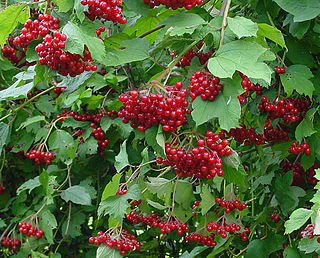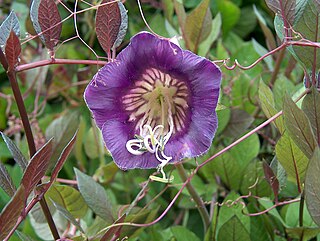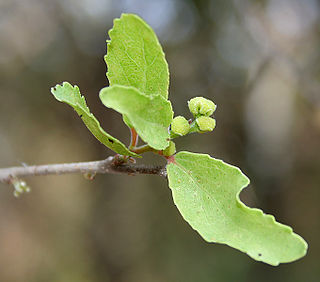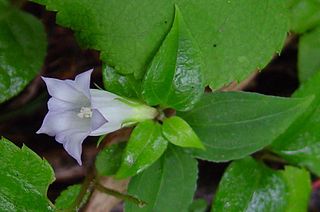
Gentiana is a genus of flowering plants belonging to the gentian family (Gentianaceae), the tribe Gentianeae, and the monophyletic subtribe Gentianinae. With over 300 species, it is considered a large genus. Gentians are notable for their mostly large trumpet-shaped flowers, which are often of an intense blue hue.

Viburnum is a genus of about 150–175 species of flowering plants in the moschatel family, Adoxaceae. Its current classification is based on molecular phylogeny. It was previously included in the honeysuckle family Caprifoliaceae.

Gentianaceae is a family of flowering plants of 105 genera and about 1600 species.

Zanthoxylum is a genus of about 250 species of deciduous and evergreen trees, shrubs and climbers in the family Rutaceae that are native to warm temperate and subtropical areas worldwide. It is the type genus of the tribe Zanthoxyleae in the subfamily Rutoideae. Several of the species have yellow heartwood, to which their generic name alludes. Several species are cultivated for their use as spices, notably including Sichuan pepper.

Chrysochlamys is a plant genus of the family Clusiaceae. It includes 36 species native to the tropical Americas, ranging from southern Mexico to Bolivia and northern Brazil.

Sterculia is a genus of flowering plants in the mallow family, Malvaceae: subfamily Sterculioideae. Members of the genus are colloquially known as tropical chestnuts. Sterculia may be monoecious or dioecious, and its flowers unisexual or bisexual.
William Botting Hemsley was an English botanist and 1909 Victoria Medal of Honour recipient. The standard author abbreviation Hemsl. is used to indicate this person as the author when citing a botanical name.

Dysoxylum is a genus of rainforest trees and shrubs in the flowering plant family Meliaceae. About 34 species are recognised in the genus, distributed from India and southern China, through southeast Asia to New Guinea, Solomon Islands, and Australia. The name Dysoxylum derives from the Greek word ‘Dys’ meaning "bad" referring to "ill-smelling" and ‘Xylon’ meaning "wood".

Wikstroemia is a genus of 93 species of flowering shrubs and small trees in the mezereon family, Thymelaeaceae. Hawaiian species are known by the common name ‘ākia.

Tetrastigma is a genus of plants in the grape family, Vitaceae. The plants are lianas that climb with tendrils and have palmately compound leaves. Plants are dioecious, with separate male and female plants; female flowers are characterized by their four-lobed stigmas. The species are found in subtropical and tropical regions of Asia, Malaysia, and Australia, where they grow in primary rainforest, gallery forest and monsoon forest and moister woodland. Species of this genus are notable as being the sole hosts of parasitic plants in the family Rafflesiaceae, one of which, Rafflesia arnoldii, produces the largest single flower in the world. Tetrastigma is the donor species for horizontal gene transfer to Sapria and Rafflesia due to multiple gene theft events.
Fordia is a genus of flowering plants in the family Fabaceae, native from south China and Thailand to west and central Malesia. The genus was established by William Hemsley in 1886.

Arachnothryx is a genus of flowering plants in the family Rubiaceae. It contains about 107 species. It is found from Mexico to Peru and in Trinidad.

Corynocarpus is the only genus of plants in the family Corynocarpaceae and includes five species. It is native to New Guinea, Australia, New Zealand, New Caledonia, and Vanuatu.

Cobaea is a genus of flowering plants including about 20 species of rapid growing, ornamental climbers whose native range extends from Mexico to Peru. The botanical name honors Father Bernabé Cobo, Spanish Jesuit of the seventeenth century, naturalist, and resident of America for many years. The woody stems can reach 20 ft (6 m). Leaves are alternate lobed with opposite pairs and tendrils. In late summer to early spring, the large, bell-shaped flowers are borne profusely and singly along the stems with bright green, violet, or purple in colors. The plants can become invasive in some areas, and are common weeds in New Zealand.

Flacourtia is a genus of flowering plants in the family Salicaceae. It was previously placed in the now defunct family Flacourtiaceae. The generic name honors Étienne de Flacourt (1607–1660), a governor of Madagascar. It contains 23 species of shrubs and small trees that are native to the African and Asian tropics and subtropics. Several species, especially Flacourtia indica, are cultivated as ornamentals and for their fruits. The trunks of small trees are often guarded by branching spines.

Tripterospermum is a genus of flowering plants belonging to the family Gentianaceae.
Hymenandra is a genus of flowering plants belonging to the family Primulaceae.

Lisianthius is a genus of flowering plants belonging to the family Gentianaceae.
Maharanga is a genus of flowering plants belonging to the family Boraginaceae.
Hymenidium is a genus of flowering plants belonging to the family Apiaceae.














